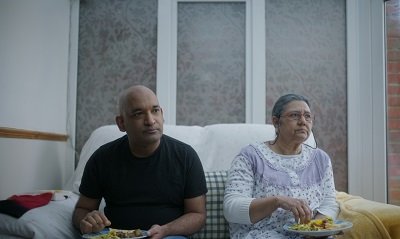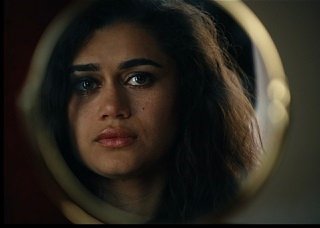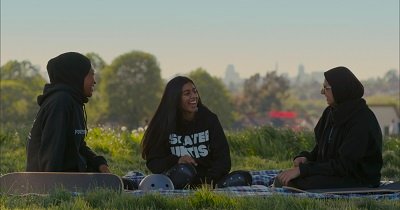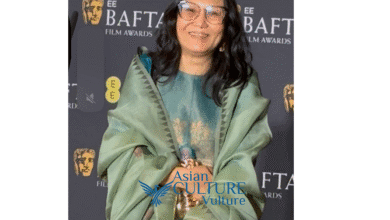LIFF 2024 – New British Asian Shorts – meet the next generation of filmmakers on their way up…
The London Indian Film Festival (LIFF) has curated a collection of short films showcasing the best of Asian emerging filmmaking talent in Britain – we catch up with several of the directors in a special short acv Q&A – with their films showing on the big screen this Saturday (June 29) in London… See ticket link at bottom…
Rehan Mudannayake about his, ‘So Long, Farewell’ (13 minutes; English & Sinhala)
www.asianculturevulture.com (ACV): What was the main inspiration for your film?

Rehan Mudannayake (RM): ‘So Long, Farewell’ is about a middle-aged British-Sri Lankan man who’s forced to choose between taking his dream job in Amsterdam, and caring for his elderly Granny (‘Achchi’) in London. I was keen to explore brown parent-child relationships, and interrogate the expectations and responsibilities that accompany them. The character of Achchi was inspired by my Dad’s mother, whom I built a narrative around. I also wanted to write about the British-Sri Lankan community, who have been underrepresented in British cinema: ‘So Long, Farewell’ may be one of the first (if not the first) British-Sri Lankan Sinhala-language films.
ACV: What did you find most difficult about making it?
RM: Casting Granny! Finding a UK-based Sri Lankan actress in Granny’s age category was a task. I reached out to the Sri Lankan community in the UK, advertised all over social media, and put out multiple casting calls on acting databases, but had zero luck. I had just two weeks to go until the shoot, and was on the verge of giving up, when Shrabani Basu (the author of ‘Victoria and Abdul’) came to my rescue. Shrabani connected me with her Sri Lankan neighbour, who in turn put me in touch with an actress friend: Anoma Wattaladeniya – who I learnt later. had worked with one of Sri Lanka’s most famous autueurs, Sir Lester James Peries.

ACV: Please tell us a little bit about your background, film experience prior (if any) and what you hope to do in the future…
RM: Over the last 10 years, I’ve written and directed several shorts that have played at numerous international festivals, including LA Oscar-qualifiers like Hollyshorts and the Pan-African Film Festival.
As an actor, I recently played a co-lead in Oscar-nominee Deepa Mehta’s Netflix film ‘Funny Boy’, distributed by Ava duVernay.
I’m currently in post on two shorts I wrote & directed this year: the former, a dark family drama set in Sri Lanka, the latter a cheeky London-based comedy titled ‘Cougar’), starring stand-up comedian Vidura BR.
Rajinder Kaur Kochar tells us about her ‘Rita Goes Viral’ (13 mins; English)

www.asianculturevulture.com (ACV) What was the main inspiration for your film?
Rajinder Kaur Kochar (RKK): I’ve a keen interest in how British Asian women are represented on screen and hope to tell female-led stories that might subvert cliché and stereotype. I wanted to confront the sense of guilt and secrecy surrounding the subject of sex in our community and how that might impact our relationships with one another. I decided, therefore, to set the story in a multi-generational context, to examine how women might enable patriarchy and to ask: if we share our shame, could we be relieved of it?
ACV: What did you find most difficult about making it?

RKK: Shooting the film during the Covid aftermath was a challenge, and of course a tight budget and schedule meant we had little room for error. A lack of rehearsal time with actors was alleviated by my longstanding relationships with the crew. The most difficult aspect, however, was script-based: how to tell the story of three women, their relationships and create a satisfying story arc for each character in a short space of time.
ACV: Please tell us a little bit about your background, film experience prior (if any) and what you hope to do in the future…
RKK: After graduating from the National Film & TV School, I supported the production of many films and worked with established directors and actors. When I started as a writer/director with a short for Film London, my extensive production experience helped me to evolve into my new role with confidence. I currently have three feature projects in development as writer and/or director and excited to be releasing a feature later this year as an associate producer.
Mehek Azmathulla on her documentary, ‘Skater Uktis’ (7 mins; English)
www.asianculturevulture.com (ACV) What was the main inspiration for your film?

Mehek Azmathulla (MA): Popular media paints a very narrow picture of skateboarding. But stumbling upon Skater Uktis shattered these preconceptions. Suddenly, I saw skateboarding not as just a sport, but as an inherently ‘public’ act. It defies the need for a designated arena; the streets are your runway really. Being a Muslim girl and choosing to do something so ‘public’ was intriguing. I wanted to explore the public and the personal. How one’s personal relationship with faith coexists with something as ‘public’ as skateboarding.
ACV: What did you find most difficult about making it?
MA: Just as I was gearing up for pre-production on this film, I found myself suddenly without a full-time job. But oddly enough, losing that, reignited my creative spirit as a director. I got into the industry to make films, period. So, I was going to make this one regardless of circumstance. I poured all my creative energy (and a fair bit of savings) into it.
It was exciting and challenging. But I think the energy began to rub off on everyone who got involved – whether they worked in the film for a day or a week, it was a labour of love for us all.
ACV: Please tell us a little bit about your background, film experience prior (if any) and what you hope to do in the future…
MA: I studied directing, but for the first few years after graduation, I began to do roles more on the production and publishing side of things rather than film directing. After many side steps in the industry, over the last couple of years, I’ve been able to make my way back to my favourite place – directing. I’m currently in the process of developing multiple narrative short film projects (both in India and the UK), and hope to go into production later this year. I’m drawn to subversive stories about Indian girlhood, family and the humour of life.
Sara David is the director behind the documentary, ‘Khichdi’ (16 mins; English)
www.asianculturevulture.com (ACV) What was the main inspiration for your film?
Sara David (SD): The film was responding to the lack of ethnic diversity in the NHS on Film collection on the British Film Institute (BFI) Player. I wanted to share a story that I’ve grown up hearing from my mom about the sisterhoods she formed whilst training to be a nurse in Ferozepur, Punjab, I found it so fascinating that this culture at large does not exist in the West. It was super wholesome reuniting the friends through the making of this film.
ACV: What did you find most difficult about making it?
SD: The most difficult part of the filmmaking process was the vigorous amount of planning/prep work that had to be done to ensure everything worked in the limited amount of time we had to film and get the interview right. Working with non-actors and actual nurses meant that we had one afternoon to do the shoot. The aunties were followed from the minute they arrived, sat for chai, ate food, sang and shared stories to leaving. It was an exhausting day but incredibly rewarding!!!
ACV: Please tell us a little bit about your background, film experience prior (if any) and what you hope to do in the future…
SD: I come from a fine art background, hence my experimental approach towards moving image. Before my BFI x Arts and Humanities Research Council (AHRC) commission for the NHS’ 75th, I worked on a short doc for the Museum of London, which interviewed the food business owners across Drummond Street. I want to continue exploring this genre of documentary that allows me to pass down and narrate stories from my own home and that of others; at the heart of my process is filmmaking that directly involves the interviewee(s)themselves, the films are made both with them and for them.
Sanjoli Malani on ‘Chai-Coffi’ (23 mins: Hindi with English subtitles)
www.asianculturevulture.com (ACV) What was the main inspiration for your film?
Sanjoli Malani (SM): My mother and a majority of Indian homemakers forget about their dreams and desires in order to look after the wellbeing of their families. The film is an ode to the power of Indian women who can dream to be limitless at any age.
ACV: What did you find most difficult about making it?
The shoot was tough as it involved both the cast and crew to hike on tough terrains with equipment. We were filming on the go as we ourselves were travelling to these places.
The most difficult section was the last scene of the film as we hiked up to Kollukamalai (highest tea plantation in the world) in Tamil Nadu and camped overnight to catch the sunrise.
ACV: Please tell us a little bit about your background, prior film experience
(if any) and what you hope to do in the future…
I have been inclined towards cinema since a young age but things became certain when I moved to Mumbai and went on to study films. I worked in the advertising production industry for some years before moving to London for my Master’s in Filmmaking from London Film School.
With my past production experience, I had a firm understanding of the industry and how things work but the ideas, structure and methods of storytelling really evolved at film school. I slowly wish to move to long format as that is my ultimate aim, to make and watch cinema.
To reach a point where I get to tell stories and hope that people relate to it will be a true honour.
Also screening – ‘Lumbu’ by Billy Dosanjh (19 mins; English) and ‘Same Same?’ (12 mins; English, Gujarati with English subtitles) by Leah Rustomjee – more about all these films here – https://londonindianfilmfestival.co.uk/new-brit-asian-shorts-2024/
Main picture (top): Rita Goes Viral
Filmmaker responses have been edited for clarity and brevity…
Listing (direct ticket purchase link)
New Brit-Asian Shorts Programme
Institute of Contemporary Arts (ICA), The Mall, St James’, London W1Y 5AH 9pm https://ica.art/films/new-brit-asian-shorts
LIFF continues until July 3 (In London) and in other cities until July 7 – our preview



